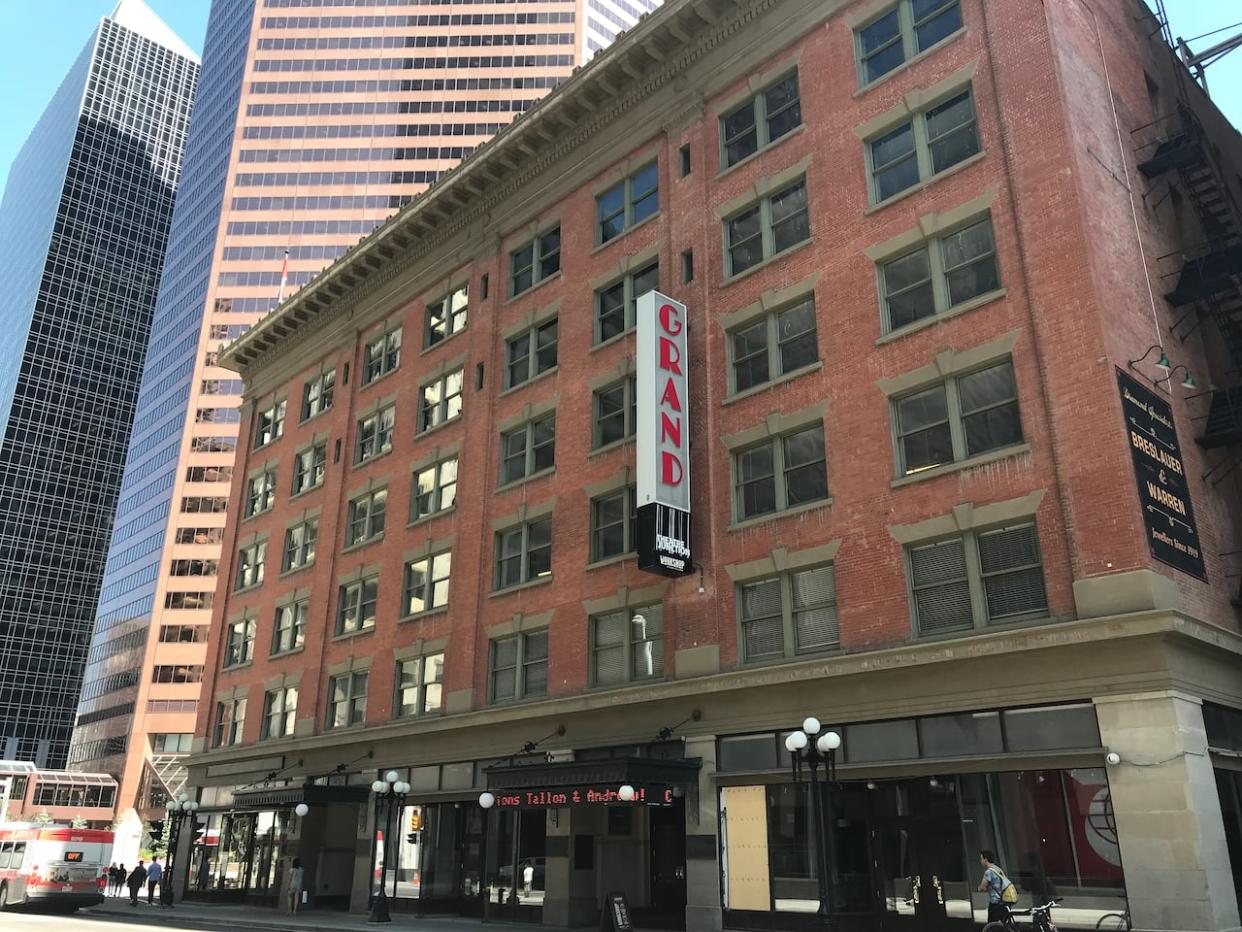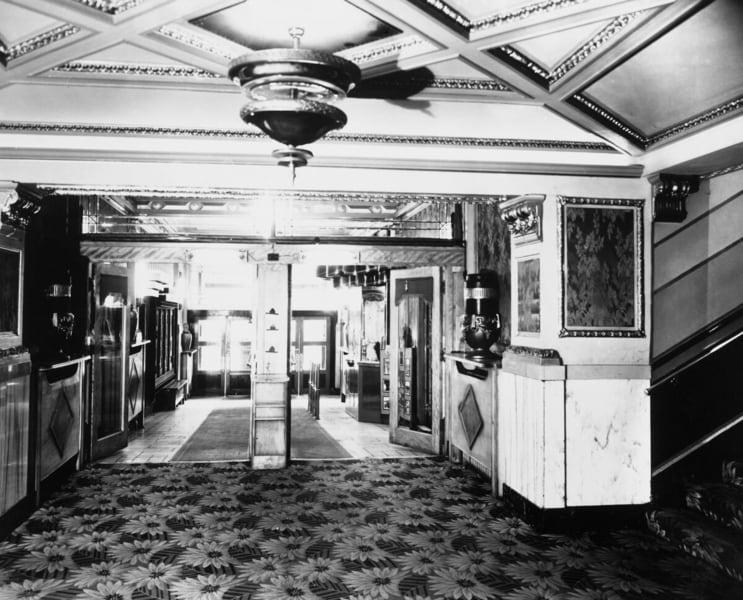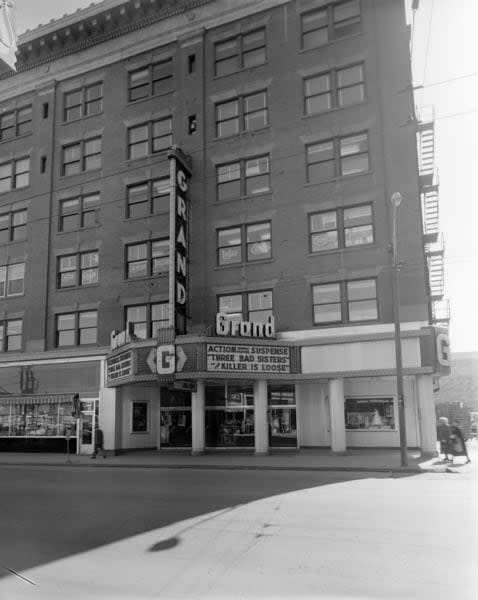Calgary's historic Grand Theatre to close if sustainable business plan not found

The executive director of the society that operates Calgary's Grand Theatre said a feasibility plan was rejected by the building's landlord at the 11th hour, leaving the historic arts and culture hub to face an uncertain future.
Erynn Lyster said the plan was focused on creating a sustainable financial future for the Grand Theatre, and centred on a resource-sharing agreement to bring theatre operations under the umbrella of Arts Commons.
Lyster said they had been working on the proposal for the last two years and found out in January that the landlord of the Grand Theatre building, Allied Properties Real Estate Investment Trust (REIT), was no longer in support.
"We were really excited to share this with the community, this was a well-thought-out plan that was sustainable," said Lyster.

The lobby at the Grand Theatre in 1933-34. Built in 1912 as a vaudeville theatre, the Grand's space has been home to a variety of arts and artists over the years. (Glenbow Archives/University of Calgary)
"All parties were at the table, the terms seemed really amenable. We honestly thought we were putting the final touches on an agreement and instead our proposal was rejected at the last minute."
She added that, up until the plan was rejected, she was under the impression that Allied shared their long-term vision for the Grand Theatre.
The Grand Theatre was sold to Allied in 2021. After a long search for the appropriate landlord, Lyster said the Grand Theatre Society felt comfortable selling to Allied because of their support for historic buildings.
Lyster said the rejection might have been easier to accept if it had happened earlier on in the negotiations, while the society still had time to figure out a different financial strategy.
LISTEN | Calgary Grand Theatre Society board chair discusses challenges, negotiations:
"If there were other options to pursue we would have done them a year-and-a-half ago, we just feel like we're now at the 11th hour, with very limited options in front of us."
For now, the Grand Theatre Society will continue to act in good faith with Allied, said Lyster, while trying to come up with another solution to save the Calgary institution.
Karen Ball is a long-time community leader and advocate for the arts in Calgary. She said cities need to prioritize spaces like the Grand Theatre in order for the arts to flourish.
"To see us lose a venue because there isn't a business model that supports its long term operation is heartbreaking," said Ball.

A view from the main stage inside the Grand Theatre. Karen Ball, an advocate for the arts in Calgary, says cities need to prioritize spaces like the Grand in order for the arts to flourish. (Terri Trembath/CBC)
Built in 1912 as a vaudeville theatre, the Grand's space has been home to a variety of arts and artists over the years.
Pierre Gauthier was the general manager of the Grand Theatre from the 1960s to the beginning of the 1980s, when its specialty was cinema.
"It was a great time … everybody came to the theatres in those days. I mean, everybody," said Gauthier.

The entrance of the Grand Theatre in 1956. 'Theatres will never be the same,' says Pierre Gauthier, the general manager of the Grand from the 1960s to the beginning of the 1980s. (Glenbow Archives/University of Calgary)
Now living in B.C., the former general manager says he looks back on his two decades long career with the Grand fondly.
"People came from out of town in those days. Small towns didn't get the pictures for three months, two months," he said.
"Theatres will never be the same."
Loss of creative spaces
And Ball isn't alone in these thoughts — Alex Sarian, president and CEO of Arts Commons, says there's a demand among Calgarians for artistic and cultural venues in the city, but arts organizations nationwide are in a difficult position as physical spaces are lost.
"When we were in conversations with the Grand Theatre Society and Allied REIT, it was very much in an effort to see how [Arts Commons's] expertise might actually be a contributing factor to creating a vibrant business model for that particular venue," he said.
"We are left questioning what role we can play to help ensure that this venue remains accessible to artists, arts organizations and audiences for the next 100 years."

'The loss of a venue to the public impacts arts organizations, it impacts artists, it impacts audiences, it impacts the economic activity within the downtown core,' said Alex Sarian, president and CEO of Arts Commons. (Lily Dupuis/CBC)
Sarian says losing the theatre could also have a negative effect on economic activity in the downtown core. He adds that public and private sector partners have to work together to ensure the viability and success of historical arts and culture spaces like the Grand Theatre.
"For this venue, or frankly any other venue to thrive, there is a need for social enterprise to enter the lingo of arts organizations and our business models," said Sarian.
"But it also requires private sector partners to come to the table and say that we align in our values and we align in our belief that a vibrant arts community will make our cities better."
CBC News called Allied Properties REIT requesting comment, but have not received a response.

